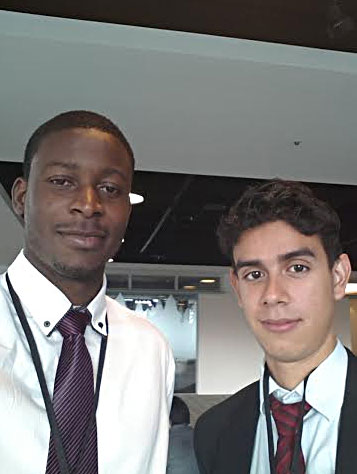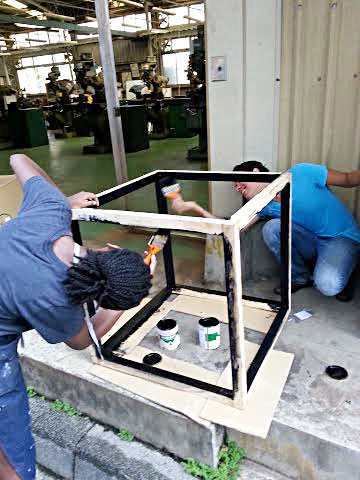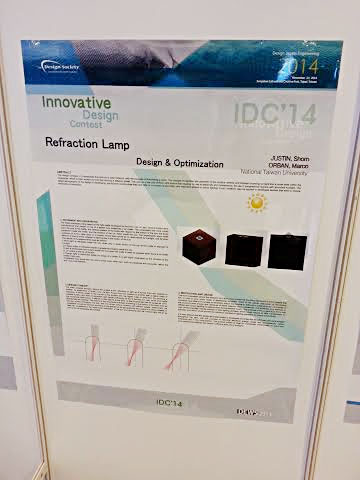 Being an engineering student from a developing country has both its benefits and its drawbacks. Even though we have been granted an opportunity to great success and much more promising career than if we had stayed in our home countries, we also have an implicit responsibility, you could even call it pressure, to give back in order to improve our society. Being an engineering student from a developing country has both its benefits and its drawbacks. Even though we have been granted an opportunity to great success and much more promising career than if we had stayed in our home countries, we also have an implicit responsibility, you could even call it pressure, to give back in order to improve our society.
 For the past months, we have been working on a small project instructed by Prof. Kuei-Yuan Chan and based on an idea that has been used to improve the lives of people in need in the poorest countries of the world. It is an idea that is both simple and beautiful: using plastic bottles as a light source for people who have none. It is basically a problem of simple optics, sunlight comes inside the bottle, and it is refracted by water, spread out, so that it acts as a rudimentary light bulb, that uses no electricity or thermal energy. Nevertheless, the process of installation is a long and tedious one, even with access to power tools, so we asked ourselves if there is any way to make it better, faster, and more importantly, cheaper. For the past months, we have been working on a small project instructed by Prof. Kuei-Yuan Chan and based on an idea that has been used to improve the lives of people in need in the poorest countries of the world. It is an idea that is both simple and beautiful: using plastic bottles as a light source for people who have none. It is basically a problem of simple optics, sunlight comes inside the bottle, and it is refracted by water, spread out, so that it acts as a rudimentary light bulb, that uses no electricity or thermal energy. Nevertheless, the process of installation is a long and tedious one, even with access to power tools, so we asked ourselves if there is any way to make it better, faster, and more importantly, cheaper.
 We have made research into this problem since September. We built a box and fitted it with sensors, taking readings of the light refracted by our bottles at different times of the day. We made a simple analysis of the distribution of light, and we made comparisons of different models, some big, some small, some with oil inside, some with water inside. Our progress was slow, but it was nevertheless progress, and as time went by, our results pointed to a better design which is not only easy to manufacture, but also more efficient, and uses sunlight as best as it can to work as a bright light that can help shine the homes of many. We have made research into this problem since September. We built a box and fitted it with sensors, taking readings of the light refracted by our bottles at different times of the day. We made a simple analysis of the distribution of light, and we made comparisons of different models, some big, some small, some with oil inside, some with water inside. Our progress was slow, but it was nevertheless progress, and as time went by, our results pointed to a better design which is not only easy to manufacture, but also more efficient, and uses sunlight as best as it can to work as a bright light that can help shine the homes of many.
 But research is nothing if you cannot show it to others, and convince them of the potential of it. We were very grateful to hear that we would be able to showcase our results at the International Design Competition, and hear the opinion of professionals of both research and design. All in all, participating was a very informative experience, especially since it is a good way to learn how to express information in a succinct and straightforward way, with the very strict time limit and the lack of ample presentation space. In fact, we were very satisfied with our overall presentation. But research is nothing if you cannot show it to others, and convince them of the potential of it. We were very grateful to hear that we would be able to showcase our results at the International Design Competition, and hear the opinion of professionals of both research and design. All in all, participating was a very informative experience, especially since it is a good way to learn how to express information in a succinct and straightforward way, with the very strict time limit and the lack of ample presentation space. In fact, we were very satisfied with our overall presentation.
 We did not end up winning any awards, but we think that’s OK. The exposure to a competitive environment and the scrutiny of the judges just proved to us that if we are to succeed and push forward those ideas that we believe in, we have to work harder and insist even more. We will keep doing our research in our small light bottle project, and hopefully, using the knowledge, and most importantly, the experience of both our successes and our failures, we will one day be able to feel satisfaction in knowing that somewhere, even if it’s in a very remote area of the world, there will be someone that will be able to do their math homework under the light of our humble lamp. We did not end up winning any awards, but we think that’s OK. The exposure to a competitive environment and the scrutiny of the judges just proved to us that if we are to succeed and push forward those ideas that we believe in, we have to work harder and insist even more. We will keep doing our research in our small light bottle project, and hopefully, using the knowledge, and most importantly, the experience of both our successes and our failures, we will one day be able to feel satisfaction in knowing that somewhere, even if it’s in a very remote area of the world, there will be someone that will be able to do their math homework under the light of our humble lamp.
|
| █ Final experimental setup. |
|
 |
| █ Shorn Justin (left) and Marco Orban. |
 |
| █ Preparing box for experiment. |
 |
| █ IDC exhibition station. |
|

